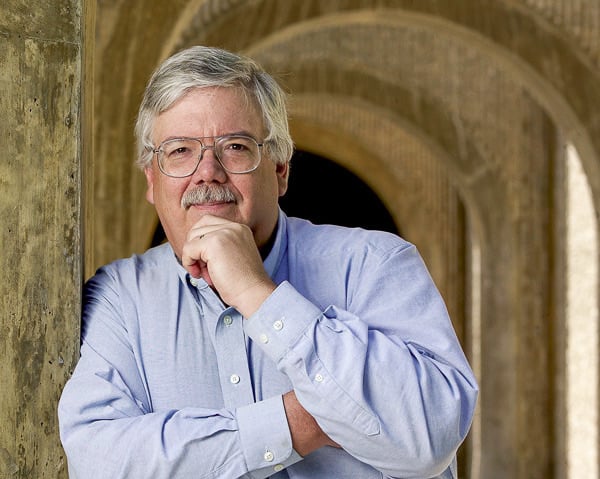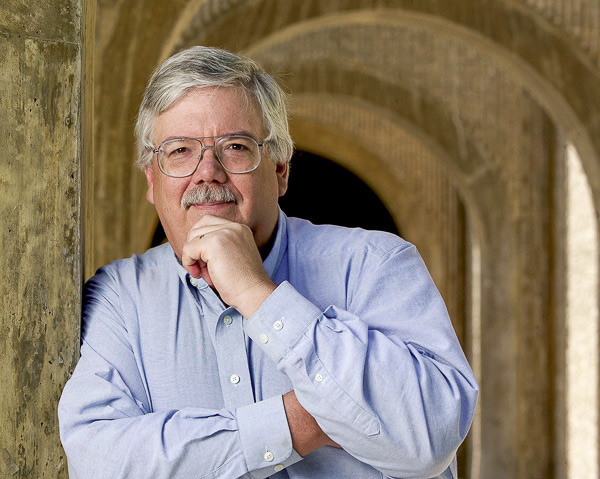
“You know, it’s kind of silly to get an award for giving a lot of talks,” Hank Greely ’74 said. “Especially when you’re a ham like me. I kind of felt like I should pay them for giving me audiences.”
Greely is the latest recipient of the Lyman Award, a prestigious honor given in recognition of faculty service by the Stanford Alumni Association.
Greely, a professor of law and the director for the Center for Law and Biosciences, won the award for his dedication to giving frequent talks and lectures to the alumni community both on campus and at events across the country.
Howard Wolf ’80, president of the Stanford Alumni Association, said that Greely was a clear choice for this year’s award, which was named in President Emeritus Richard Lyman’s honor and was established in 1983.
“Stanford faculty are at the core of our alumni programs, helping us reach, serve and engage alumni,” Wolf said. “Hank’s a great Stanford ambassador, taking every opportunity to connect with alumni and share what’s happening on campus, even beyond his own academic work.”
As both an alumnus and a current professor, Greely has close ties to the Farm that began with his undergraduate years during the early 1970s.
“I lived in Larkin and in Zapata and Twain, [but] Burbank was notorious for their wild parties,” he recalled. “My freshman and sophomore years, there was still some significant anti-war riots, and those were really interesting experiences.”
Greely decided to study law after realizing he was not cut out for a math major during his freshman year.
“It was the second [math] midterm during my third quarter of my freshman year that my natural math ability deserted me without giving me much warning,” he said. “So I decided I should be a lawyer and not be a scientist.”
After obtaining a degree from Yale Law School in 1977, Greely worked for Judge John Minor Wisdom on the Fifth Circuit Court of Appeals. His son, John Wisdom Greely, is named after the judge, giving him “a name to try to live up to in more ways than one.”
Greely went on to clerk for Supreme Court Justice Potter Stewart, then worked briefly for the Carter administration’s Department of Defense and Energy before joining the Los Angeles law firm Tuttle and Taylor. Dissatisfied with litigation work, Greely became restless.
In an effort to find a career that better suited his intellectual drive, Greely returned to the Farm in 1985 as a professor.
“I was hired to teach oil and gas law because I’d worked at the Department of Energy,” he said. “Stanford had the country’s two leading oil and gas law scholars, and they both retired. The Department of Energy actually had nothing to do with traditional oil and gas law, but if the Stanford faculty thought it did, who was I to correct them?”
Despite the initial confusion, Greely has been at Stanford ever since, where he specializes in teaching the ethical, legal and social implications of biomedical technologies, an emerging field of research.
Although much of his work deals with the controversial issues at the intersection of ethics, biotechnology, law and politics, Greely remains philosophical about his public role.
“My main goal isn’t to persuade people but to educate them,” he said, explaining his philosophy on presenting contentious information that, for instance, deals with the ethics of abortion or stem cell research.
“I want to point out some of the consequences and some of the analogies, but I’m not going to try and change your mind,” he said. “At least about whether you think it’s right or wrong. I try to change your mind about what the social response should be.”
Greely’s perspective on his work is analogous to a lawyer’s role in client interactions.
“You lay out the options, the pluses and minuses, in an intelligent way so that your client can make a good decision,” he said.
To do so, the science behind biotechnologies must be simplified and explained to an audience with no assumed technical background.
“I try to remember how I first learned it because I don’t have a scientific background,” Greely explained. “My last biology class was in 10th grade. My undergrad degree is in science, but it’s in political science, which is not quite the same. I had to learn all this.”
Greely’s devotion to the Stanford community, both as an alumnus and as a professor, shows no sign of wavering, given his love for his alma mater.
“It’s the best place in the world,” he said. “[Stanford has a] culture that is fun. It’s stimulating. There’s a sense of possibilities, the feeling that everything is possible. You know that it’s not, but could be.”
